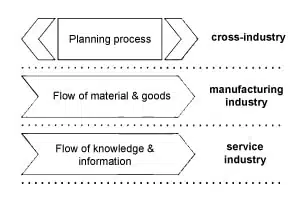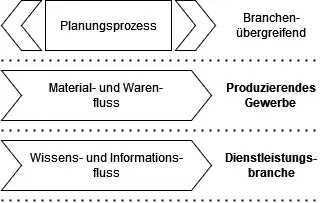ERP systems tend to be often linked to manufacturing companies in the public perception. There are historical reasons for this, as company-wide resource planning has a lot to do with inventory management and the organization of manufacturing processes. However, service companies also benefit from the use of professional ERP software such as Odoo; it helps to optimize and automate processes and to unlock new potential for value creation.
IT-supported process automation has a long tradition in manufacturing companies. Service providers, on the other hand, often still find it difficult to standardize their service processes. It is therefore not surprising that ERP systems tend to be associated with manufacturing industries. This can be attributed primarily to the fact that the primary target group of ERP system providers was indeed once manufacturers. But in the service age, service providers increasingly need planning tools to support them in their daily work.
According to the German Federal Statistical Office, four out of five companies were already active in the service sector in 2017 – with a rising trend. Also interesting: 61 percent of all employees worked in small to medium-sized companies in 2016. Developers of ERP systems are taking these change processes into account as well: They are increasingly implementing functions that are specifically required in the service industry, such as functionality for project management, time tracking, and the helpdesk.
Focus on flow of information instead of flow of goods
ERP systems usually handle company-wide planning and control tasks. They form the central interface between the various business units – this is where the strings from the various corporate divisions run together. Their central purpose is to capture the company as a whole; here, the focus – as can easily be deduced from the term ‘Enterprise Resource Planning’ – is on resources.
Service and manufacturing companies differ in terms of resources. The key difference between manufacturing and service-oriented companies: For one, materials and goods flow; for the other, it is information and knowledge (Figure 1).

Figure 1: Manufacturing companies and service companies differed primarily in terms of what flows along the planning processes (Source: Own representation).
A key feature of ERP systems is their integration capability: they are able to bring together the various functional areas and associated processes. In this respect, the systems can be pictured like a modular system, in which the modules that are relevant for the company are selected depending on the respective task area. In Odoo, this aspect is implemented particularly well in the module management: Service companies pick out the modules that optimally map their respective business model.
These are the most useful Odoo features for service providers
Regardless of whether it’s management consultancies, financial services, architects, software companies or communications specialists – the core ERP requirements in the service sector are essentially identical.
Complete Overview of Business Operations
In order for companies to be able to react quickly and flexibly to market developments, they first need an exact picture of the company’s internal processes. However, practice shows that over the years, many isolated solutions have emerged that allow no or only a limited exchange of information. A CRM system here, an accounting system there, then a tool for project management, and yet another for e-commerce. What is missing is an overall picture of the various sub-processes and their interdependencies. But it is precisely this view that is invaluable for management in order to be able to plan strategically.
An ERP system such as Odoo puts an end to this patchwork: It creates a company-wide view of all processes and decision-relevant business information.
Fully automated from lead to invoice
Odoo ERP allows service companies to automate the entire lead-to-sale-order-to-invoice funnel. Demanding tasks can thus be managed automatically. In practice, this results in various advantages, such as:
- The system reveals from how many leads a sale order was created.
- It shows management from how many sale orders an invoice or subscription was generated.
The benefit here is that instead of a multitude of information sources, Odoo provides you with reliable information as a single source.
Reducing the error rate of business processes
Closely linked to the need for centralized data management is the need for automatic process controls that ensure that the error-proneness of processes remains as low as possible. For fast-growing companies in particular, this becomes a problem when, for example, subscription billing or employee time recording disappears into data nirvana.
In contrast to the manufacturing industry, service companies juggle services, but are faced with the challenge of fully mapping provided work. In this context, services providers are highly dependent on the correct data entry by their employees. Odoo offers a suitable solution for this as well. Automated control mechanisms reveal inefficiencies and provide information on missing data entries.
Automated invoicing
The correct recording of delivered services is of high relevance for service companies – it is the only way to accurately bill the customer for delivered work. Odoo has the right solution for this as well. Its automatic invoice generation supports different service types. Employees record delivered services directly in the respective projects; these data can then be used to generate a draft invoice, which only needs to be compared with the respective expectations. With this, manual invoicing is a thing of the past.
But that’s not all: Odoo also allows the creation of products with different billing types (subscriptions, prepaid products and time recording). This enables service providers to offer their customers different billing types; at the same time, it saves time when discussing offers.
Odoo is ideal for service providers who work with subscription models. The “Odoo Subscription App” allows automatic subscription billing after the billing interval has been configured once for the entire runtime. Odoo also handles automatic billing in the process.
Support for distributed service companies
For service companies that are spread across different locations – both nationally and internationally – Odoo offers the option of centralized control of all sub-companies and cross-company collaboration. The refined control of user rights proves to be advantageous in this context. Odoo can control these for individual locations, but also company-wide on a project-, data- or function-specific basis.
Conclusion
The use of ERP systems such as Odoo ERP has long since ceased to be the domain of manufacturing companies – on the contrary. They promise a wide range of optimization and automation effects, especially for service providers. When using Odoo, service providers benefit from the fact that the various functions are seamlessly integrated.
We optimize Odoo for your service business
Focus on flow of information instead of flow of goods
ERP systems usually handle company-wide planning and control tasks. They form the central interface between the various business units – this is where the strings from the various corporate divisions run together. Their central purpose is to capture the company as a whole; here, the focus – as can easily be deduced from the term ‘Enterprise Resource Planning’ – is on resources.
Service and manufacturing companies differ in terms of resources. The key difference between manufacturing and service-oriented companies: For one, materials and goods flow; for the other, it is information and knowledge (Figure 1).

Figure 1: Manufacturing companies and service companies differed primarily in terms of what flows along the planning processes (Source: Own representation).
A key feature of ERP systems is their integration capability: they are able to bring together the various functional areas and associated processes. In this respect, the systems can be pictured like a modular system, in which the modules that are relevant for the company are selected depending on the respective task area. In Odoo, this aspect is implemented particularly well in the module management: Service companies pick out the modules that optimally map their respective business model.
These are the most useful Odoo features for service providers
Regardless of whether it’s management consultancies, financial services, architects, software companies or communications specialists – the core ERP requirements in the service sector are essentially identical.
Complete Overview of Business Operations
In order for companies to be able to react quickly and flexibly to market developments, they first need an exact picture of the company’s internal processes. However, practice shows that over the years, many isolated solutions have emerged that allow no or only a limited exchange of information. A CRM system here, an accounting system there, then a tool for project management, and yet another for e-commerce. What is missing is an overall picture of the various sub-processes and their interdependencies. But it is precisely this view that is invaluable for management in order to be able to plan strategically.
An ERP system such as Odoo puts an end to this patchwork: It creates a company-wide view of all processes and decision-relevant business information.
Fully automated from lead to invoice
Odoo ERP allows service companies to automate the entire lead-to-sale-order-to-invoice funnel. Demanding tasks can thus be managed automatically. In practice, this results in various advantages, such as:
- The system reveals from how many leads a sale order was created.
- It shows management from how many sale orders an invoice or subscription was generated.
The benefit here is that instead of a multitude of information sources, Odoo provides you with reliable information as a single source.
Reducing the error rate of business processes
Closely linked to the need for centralized data management is the need for automatic process controls that ensure that the error-proneness of processes remains as low as possible. For fast-growing companies in particular, this becomes a problem when, for example, subscription billing or employee time recording disappears into data nirvana.
In contrast to the manufacturing industry, service companies juggle services, but are faced with the challenge of fully mapping provided work. In this context, services providers are highly dependent on the correct data entry by their employees. Odoo offers a suitable solution for this as well. Automated control mechanisms reveal inefficiencies and provide information on missing data entries.
Automated invoicing
The correct recording of delivered services is of high relevance for service companies – it is the only way to accurately bill the customer for delivered work. Odoo has the right solution for this as well. Its automatic invoice generation supports different service types. Employees record delivered services directly in the respective projects; these data can then be used to generate a draft invoice, which only needs to be compared with the respective expectations. With this, manual invoicing is a thing of the past.
But that’s not all: Odoo also allows the creation of products with different billing types (subscriptions, prepaid products and time recording). This enables service providers to offer their customers different billing types; at the same time, it saves time when discussing offers.
Odoo is ideal for service providers who work with subscription models. The “Odoo Subscription App” allows automatic subscription billing after the billing interval has been configured once for the entire runtime. Odoo also handles automatic billing in the process.
Support for distributed service companies
For service companies that are spread across different locations – both nationally and internationally – Odoo offers the option of centralized control of all sub-companies and cross-company collaboration. The refined control of user rights proves to be advantageous in this context. Odoo can control these for individual locations, but also company-wide on a project-, data- or function-specific basis.
Conclusion
The use of ERP systems such as Odoo ERP has long since ceased to be the domain of manufacturing companies – on the contrary. They promise a wide range of optimization and automation effects, especially for service providers. When using Odoo, service providers benefit from the fact that the various functions are seamlessly integrated.